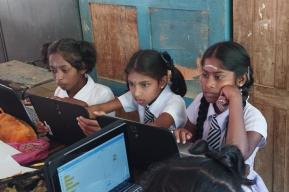Adwoa Padiki Nartey is a 33 year-old researcher at the University of Ghana who is striving to understand how microbes come to resist antibiotics, in order to inform the development of more effective antibiotics. Dr Padiki Nartey is one of two recipients of a three-month research fellowship awarded this year jointly by UNESCO and the European Molecular Biology Laboratory (EMBL). This fellowship will enable her to pursue her research at EMBL headquarters in Heidelberg, Germany, from December 2023 onwards.
The other recipient is Tendai Washaya from the University of Zimbabwe. Like Adwoa, Tendai’s research project is tackling resistance to medication. However, whereas Adwoa’s project is focusing on the bacteria’s resistance to the medication designed to kill them, Tendai’s research is focusing on the resistance of the human body to medication.
What motivated you to undertake this research project?
Antimicrobial resistance remains a global health threat, especially on the African continent where there are over 700 000 deaths annually and there could be an estimated 4.1 million deaths by 2050, as reported by the World Health Organization (WHO). The increasing resistance, the recurrence of infection and eventual death is a concern to most scientists globally and especially within Africa.
Personally, as an African scientist, I have experienced antibacterial resistance and the recurrence of infections to the point where a last resort antibiotic was prescribed. My fears of not recovering made the whole experience a scary one. A few questions I have asked after this experience have been, what happens to the many who do not have the strength to survive an infection recurrence? What happens when pathogens become resistant to the last resort antimicrobials?
These thought-provoking questions are my motivation for this project, which is to better understand resistance phenomena at the molecular genomic level of the microbe and leverage that knowledge, in combination with discovery and development of new antibacterial drugs with longer timelines as a power tool in mitigating antimicrobial resistance.

Is antibiotic resistance a major problem in Ghana?
The increase in antibiotic resistance in Ghana over the past decade has been a major public health concern. A study by Newman et al in 2011 showed that over 70% of pathogenic bacteria isolates, sampled from hospitals across the nation, were resistant to the conventional antibiotics. More recent studies by Inusah et al in 2021 suggest an increase in this percentage.
This surge in resistance and the eventual mortality of some individuals may have contributed to the report by WHO in November 2022 which states that sub-Saharan Africa has the highest mortality rate globally due to antimicrobial resistance.
How are you approaching this problem through your research and what do you hope to achieve?
In microbial drug discovery, new microbes from underexplored ecological niches have proven to be key sources in the discovery of new antimicrobials. Fortunately, Ghana happens to be an unexplored microbial biodiversity hotspot. My current research is focused on isolating novel antimicrobials from 10 newly isolated Streptomyces sp. bacteria from Ghana. Streptomycetes are extremely useful bacteria, as they produce over two-thirds of antibiotics of natural origin.
I am of the opinion that exploring new strains of the species could lead to the discovery of some novel molecules that can be used for the production of antimicrobial medicines. The aim of this research is to provide the drug discovery pipeline with novel molecules for probable development into antimicrobials with longer timelines of resistance. Again, with the current approach of mitigating antimicrobial resistance by understanding resistance at the genomic level, new Streptomyces isolates will present new genomic sequence data which adds to accumulated datasets and increases capacity of scientist worldwide to better understand resistance and provide an advantage to the discovery of new mechanisms of resistance.
How do you hope to benefit from being hosted by EMBL headquarters in Germany?
The European Molecular Biology Laboratory (EMBL) in Germany is one of the world’s leading laboratories, with research expertise in cell, genome and computational biology, among other research areas.
The laboratory’s state-of-the-art core facilities in genome biology and system microbiology, coupled with the personnel’s expertise, should greatly help by enabling me to identify antimicrobial biosynthetic gene clusters, as well as associated resistance, in the newly isolated Streptomyces species.
Also, the use of new technology within EMBL’s metabolomics core facilities should significantly enhance the detection and characterization of molecules from these microbial isolates. Metabolomics studies small molecule compositions within the cells and tissues of organisms.
Additionally, the mentorship, network and guidance in project development that this fellowship offers will not only enhance my research experience but also create an avenue for the development of future collaborative projects.
On a more personal note, could you say a little about your education, training and personal life?
I completed my Bachelor of Science degree in Chemistry at the University of Ghana, which I followed with a year of service at the university’s Department of Chemistry as a teaching assistant in fulfillment of a governmentally mandated service to the nation. I later enrolled in a master’s degree in chemistry. However, after the first year of my MPhil training, it was converted to a PhD programme.
I was awarded a PhD fellowship (Sandwich option) by the Organization for Women in Science for the Developing World, a programme unit of UNESCO. This fellowship was sponsored by the Swedish International Development Cooperation Agency (SIDA) in the first year of my PhD studies. This led me to undertake 18 months of my research period at the Rhodes University in South Africa. My postgraduate research focused on isolating and characterizing a new antiparasitic lipopeptide from a Ghanaian novel Bacillus sp. strain DE2B.
After graduating in 2020, I worked with the Marine and Plant Research Laboratory of Ghana within the University of Ghana and assisted with the isolation and documentation of new microbial species from underexplored areas in Ghana. In December 2021, I joined the Department of Biochemistry, Cell and Molecular Biology at the University of Ghana as a new member of faculty.
Growing up, I was a curious child and that, certainly, has not changed. I am still intrigued about picking up new skills or trying new cuisines. I love to listen to music while I knit. I am yet to begin a family of my own but enjoy spending time with my extended family.
Interview by Susan Schneegans










